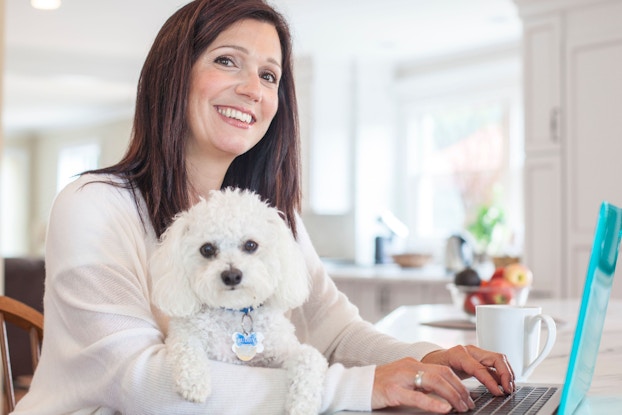
Necessity is the mother of invention, as the saying goes, and some of the most successful new consumer products on the market were developed to solve a real problem in the life of the brand’s founder. WubbaNub, a line of baby pacifiers attached to cuddly plush toys, is one such product, born when founder Carla Schneider’s colicky newborn son needed a better way to hang onto his pacifier while on a car trip.
WubbaNub is over 20 years old but has experienced its most dramatic growth in recent years, thanks in large part to its popularity among celebrity parents (Kylie Jenner, Chrissy Teigen and DJ Khaled among them). This year it brought newfound excitement to the pacifier aisle, collaborating on WubbaNub collections with late night host and children's book author Jimmy Fallon, as well as teams from Major League Baseball and the NHL.
Despite the effects of the pandemic as well as closures of two of WubbaNub’s major retail partners, Babies R Us and Toys R Us, the company has seen 400% top-line growth over the past eight years.
With millions of WubbaNubs now sold at retailers from Target to Nordstrom, Schneider still owns and operates the company and takes a personal approach to running a consumer brand. “When I look at the name WubbaNub, I see me behind it,” Schneider told CO—. “Our strategy comes down to listening and always being there for the customer. I want each person to know that it's more than just a sale to me.”
Honestly, I don’t want to say it was easy. But the calls [from retailers] would come to me organically. All of these great partnerships and opportunities happened because they reached out to us.
Carla Schneider, founder and CEO, WubbaNub
Word of mouth
Read on for some tips on how to spread the word about your business.
Special ed teacher turned entrepreneur
Twenty years ago, Schneider had the bright idea to sew her son’s pacifier to one of his favorite stuffed animals. After fielding questions from friends and strangers about where they could get their own version, she recognized the opportunity to bring innovation to the run-of-the-mill pacifier market.
Before launching WubbaNub, Schneider was a special education teacher and a brand-new mom. Unlike many contemporary founder startup stories, achieving hockey stick growth didn’t motivate the line. Instead, Schneider just wanted to soothe babies and provide parents with the same relief she found from her homemade WubbaNub, informed by her experience in classrooms and with her own children.
Since the start of the business, Schneider has been donating to hospitals’ newborn intensive care units via a program called WubCares. “It was very important for me to have a charity component to the business,” she says. “Selling into Target and doing these collaborations is exciting, but that charity piece is really the heartbeat of this organization.”

Disrupting and differentiating in a shifting pacifier market
Dominated by legacy players like Philips, Chicco and Evenflo, the baby pacifier category was one ripe for disruption. Valued at $352.2 million in 2018 by Allied Market Research, the market is forecast to reach $522.6 million by 2026.
As a small ticket item, pacifiers are most often sold in physical stores, rather than online, according to an Allied Market Research report. “Customers always prefer to [try out] these products before purchasing it, and offline stores facilitate and cater to such requirements.”
But that’s been changing in recent years, and post-pandemic, consumers’ online purchases have surged.
Over the past five years, WubbaNub has seen online sales growth of over 36%. According to Schneider, the brand’s sales are currently split almost evenly between online and offline channels. The company’s small size and independence works in its favor, Schneider says, allowing WubbaNub to pivot and adapt more quickly than a major CPG (consumer products goods) company might be able to.

How a devoted fanbase drives WubbaNub’s expansion
WubbaNub continues to benefit from one of the most valuable forms of marketing: word of mouth.
The company's first line of distribution was mainly into hospitals, where new parents would learn about the product and then ask for it at their local boutiques. To meet this demand, retailers began reaching out to Schneider directly. WubbaNub sold into more boutiques, eventually expanding to big box retailers like Target and Buy Buy Baby, as well as department stores including Nordstrom and Saks Fifth Avenue, and online via Amazon.
“Honestly, I don’t want to say it was easy,” she said, “but the calls [from retailers] would come to me organically. All of these great partnerships and opportunities happened because they reached out to us.”
The high-profile collaborations came about via word of mouth as well: Jimmy Fallon had purchased the pacifiers for his own children, as had some of the New York Yankees, and suggested they collaborate on official merchandise sold online and in stadiums. The success of WubbaNub’s foray into sports led to a deal with Fanatics, one of the industry’s largest sports merchandise retailers.
Despite WubbaNub’s celebrity associations, Schneider’s plans for the future remain committed to reaching as many families as possible via new retail channels. “We are expanding into grocery and drug stores because we want to make sure that WubbaNub is accessible,” she said. The product line is also expanding to serve children beyond the infant stage, a choice driven by overwhelming customer demand for products that can grow with their children.
“I was very fortunate that our fans are what really catapulted us from a product to a consumer brand,” Schneider said. “People fell in love with it as much as I loved it.”
CO— aims to bring you inspiration from leading respected experts. However, before making any business decision, you should consult a professional who can advise you based on your individual situation.
Follow us on Instagram for more expert tips & business owners stories.
CO—is committed to helping you start, run and grow your small business. Learn more about the benefits of small business membership in the U.S. Chamber of Commerce, here.








